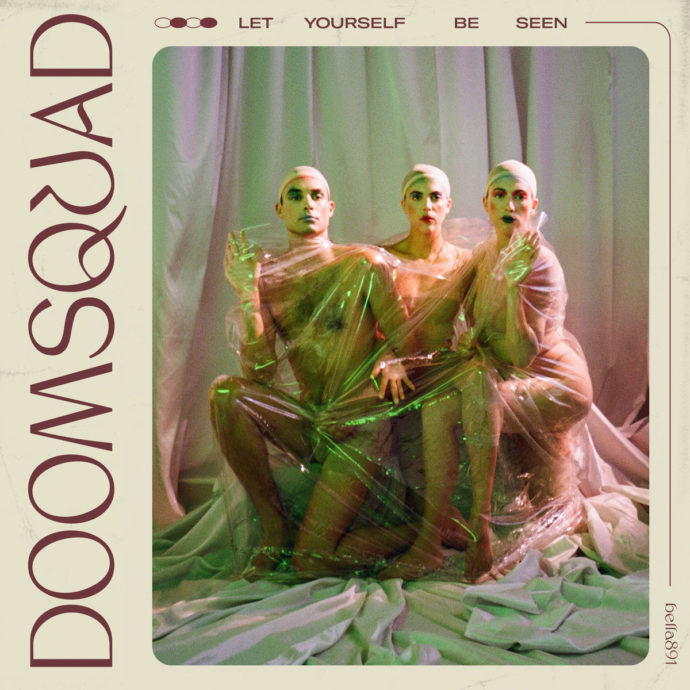Peering from the fringes of Toronto, Canada, disco-retro pop band Doomsquad releases their new full-length entitled Let Yourself Be Seen. Since their first release in 2011, Land O’ The Silver Birch E.P, the trio’s sound has transformed from melodically experimental to a tenacious beat driven electronic vibe. Their new album is a pure example of their evolution as they take us into an introspective world of self-deceit to self-acceptance. Balancing their rawness with their slow-burn beats, listeners will have the ability to explore their bodies and identity in Doomsquad’s imaginative dancehall.
From the beginning, Doomsquad gives storytelling a new meaning in the single “General Hum.” Singer, Trevor Blumas embodies a Peter Murphy and James Murphy-esque conversational vocal melody as he narrates his personal conviction of identity between social media and real-life. Using the dense bass drum to pierce through the multidimensional sequencer, singers Jaclyn and Allie Blumas make their vocal appearance in the pre-chorus with a captivating line, “I’m following you when I should be following me.” Their message becomes clearly depicted in their follow up music video, where all the members faces are merged together like an anatomical kaleidoscope. Creating a sense of personal anxiety and realism, the band cultivates an intimate room out of pure humanism.
The seamless album flows from one song to another with deliberate instances and anticipations. Entering with a drawn-out kick drum in “Aimless,” the song is a slow build into deep intensity. Revealing their dark pop-electronic influence, the triggering the high-chimes of the arp keyboard meshes well with the consuming bass riff that is blood pulsing. Followed by the gravitational pull of the up-tempo beat in “Let It Go,” Doomsquard sculpts a grim rabbit hole with a translucent pattern. The grime sequence, cathartic guitar solo, and organic voice of one of the Blumas sisters decorate another personal space for their audience.
Just as the music does its part, it is important to notice the album artwork. Doomsquad methodically illustrates the title with a sophisticated picture of the band wrapped up in clear plastic. Additionally, the unconcealed batch of emotions is captured as the trio’s androgynous look fearlessly embrace who they are. As the plastic represents screens, the perceptible motif of self-confinement is a classic indication of protection. Meaning, that society uses an unwrapped veil to cover their true identity and mask it with specific images of self-gratification. Naturally, the picture describes the music in full. Being unprotective and challenging, they parallel their authenticity from their art to their sound.
Without disguising their relentless ability to push boundaries, it is transparent that Doomsquard does more than just explore the sonic capabilities. Using their transformative message about identity to enter our personal space without causing chaos, they reveal what they have to offer as artists and as people. Communicating that there are borders and limits that should be contested inside of each of us. This album demonstrates love and affection for humanity without compromising their values. As the pre-chorus in “General Hum” clearly states the theme of the album, “I try to keep myself mindful. I try to stay humanized. But my practice is eroding, since 2016,” the trio will make their mark as being consciousness electronic music artists.
Rating: 9.3/10

